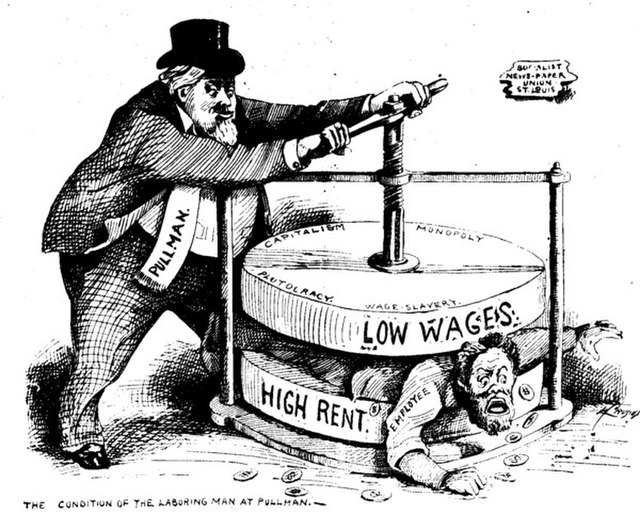The Pullman Strike was two interrelated strikes in 1894 that shaped national labor policy in the United States during a period of deep economic depression. First came a strike by the American Railway Union (ARU) against the Pullman factory in Chicago in spring 1894. When it failed, the ARU launched a national boycott against all trains that carried Pullman passenger cars. The nationwide railroad boycott that lasted from May 11 to July 20, 1894, was a turning point for US labor law. It pitted the American Railway Union (ARU) against the Pullman Company, the main railroads, the main labor unions, and the federal government of the United States under President Grover Cleveland. The strike and boycott shut down much of the nation's freight and passenger traffic west of Detroit, Michigan. The conflict began in Chicago, on May 11 when nearly 4,000 factory employees of the Pullman Company began a wildcat strike in response to recent reductions in wages. Most of the factory workers who built Pullman cars lived in the "company town" of Pullman just outside of Chicago. Jennie Curtis who lived in Pullman was president of seamstress union ARU LOCAL 269 gave a speech at the ARU convention urging people to strike. It was designed as a model community by its namesake founder and owner George Pullman.

Striking railroad workers confront Illinois National Guard troops in Chicago during the strike.
The condition of laboring man at Pullman. The employee is being squeezed by Pullman between high rent and low wages, July 7, 1894.
The American Railway Union escalated the Pullman strike beginning with the blockade of the Grand Crossing in Chicago during the night of June 26, 1894.
Violence erupted on July 7, 1894, with hundreds of boxcars and coal cars looted and burned. State and federal troops violently attacked striking workers, as this study by Frederic Remington illustrates.
Eugene Victor Debs was an American socialist, political activist, trade unionist, one of the founding members of the Industrial Workers of the World (IWW), and five-time candidate of the Socialist Party of America for President of the United States. Through his presidential candidacies as well as his work with labor movements, Debs eventually became one of the best-known socialists living in the United States.
Debs, c. 1912
Striking American Railway Union (ARU) members confront Illinois National Guard troops in Chicago during Debs's rebellion in 1894
Rogers, Elliott, Keliher, Hogan, Burns, Goodwin and Debs, the seven ARU officers jailed following the loss of the 1894 Pullman Strike
Campaign poster from his 1912 presidential campaign featuring Debs and vice presidential candidate Emil Seidel







